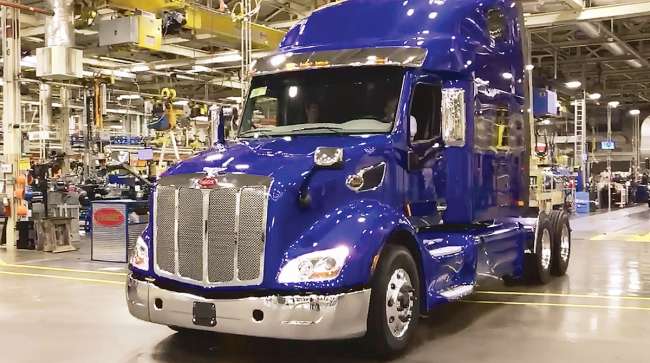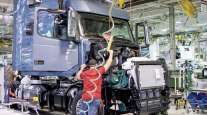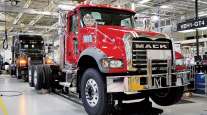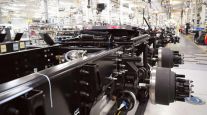Senior Reporter
April Class 8 Orders Reach 25-Year Low

[Stay on top of transportation news: Get TTNews in your inbox.]
Class 8 orders in April sank to the lowest level since 1995, when orders went negative for two months, ACT Research reported.
Seven heavy-duty truck brands routinely vie for North American orders each month. The latest preliminary net orders were 4,100 compared with 14,859 a year earlier, according to ACT.
An industry analyst with FTR suggested that after April’s orders, the cycle has shifted again. FTR pegged preliminary net orders at 4,000.
“April is the low point, and it is a severe shock,” said Don Ake, FTR’s vice president of commercial vehicles.
“However, we have hit the bottom in April,” he said. “A definite bottom, and so May starts the next recovery. The bad news is, it is going to take us an extended time to work out of this hole.”
Ake cautioned, however, if coronavirus-related health issues deteriorate more, “then everything else deteriorates.”
ACT Research: COVID-19’s Negative Impact on Trucking Deepens with April Order Intake Datahttps://t.co/u5Ci8n3uq5 — ACT Research (@actresearch) May 5, 2020
“We are in this weird situation where the fleets are very uncertain about the future, and they are holding back their orders,” he added. “You have other fleets that are doing, let’s say, OK. And they might be wanting to order more trucks, but they are delaying their orders because they don’t know how this is going to turn out and how fast the economy is going to recover.
“And then you have fleets that are not doing that well and they are looking out and, if they had orders already placed, they are canceling those orders. So you put that together, and your order rate is going to be an all-time low for what I call the modern era.”
April’s order volume was the lowest since August 1995, when orders first went negative as cancellations exceeded new orders, and that situation repeated in September, ACT Vice President Steve Tam said.
ACT had said in March it did not discount the possibility of negative order intake in April.
“So we are one step closer to potentially realizing that possibility. We expected to be headed to this neighborhood, so it doesn’t come as a surprise” that orders fell to a 25-year low, Tam said.

Tam
There was little production activity in April, but it’s starting to come back up, and what will that look like, he asked. Perhaps new processes and practices could involve taking one shift’s worth of employees and splitting them across two shift’s worth of production to get physical separation.
Meanwhile, truck makers were preparing for a complex year that will make forecasts difficult.
“The effects of the COVID-19 pandemic will hit customer demand, supply chains and vehicle production, but all of that cannot be assessed with the usual degree of detail and certainty, making the re-evaluation of the forecast for the fiscal-year 2020 complex,” Daimler AG Chief Financial Officer Harald Wilhelm said during the company’s recent first-quarter earnings call.
Daimler Trucks North America is the market leader in U.S. Class 8 retail sales with its Freightliner and Western Star brands, according to WardsAuto.com.
The fracking industry is one sector in which truck orders have fallen way off, Daimler Chairman Ola Källenius said.
“They buy trucks as well, so depressed earnings in this sector is not good for commercial vehicles,” he said. “And some other markets will be affected by this, especially the countries that heavily rely on oil. So, a too-low oil price in general is not good news. A more balanced oil price would be better for the industry as a whole.”
Volvo Group reported orders in North America in the first quarter fell 13%, to 4,732 compared with 5,469 a year earlier.
Then they stalled in March because of COVID-19, and customers and dealers have become increasingly more cautious and are canceling orders, the company report stated.
The Volvo truck plant in Dublin, Va., is running on limited production.
“It will be a gradual ramp-up, step by step. And we will be very firm on not producing anything that is not firmly ordered, because it is not in the interest of the customers, it’s not in the interest of the dealers and ourselves,” Volvo CEO Martin Lundstedt said.

Lundstedt
Meanwhile, one multibrand truck dealership is placing a bet on the future.
Worldwide Equipment announced May 4 its 71,000-square-foot, full-service facility is coming soon to Spartanburg, S.C.
The Prestonsburg, Ky., company sells vehicles from Mack Trucks, Volvo Trucks North America, Kenworth Truck Co., and Hino Trucks at more than 30 locations in 10 states.
Mack and VTNA are brands of Volvo Group. Kenworth is a brand of Paccar Inc. and Hino Trucks is a Toyota Group brand.
Want more news? Listen to today's daily briefing:




